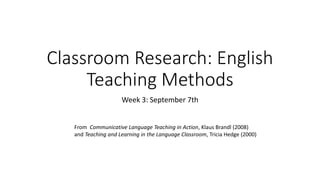
Classroom research lesson 3
- 1. Classroom Research: English Teaching Methods Week 3: September 7th From Communicative Language Teaching in Action, Klaus Brandl (2008) and Teaching and Learning in the Language Classroom, Tricia Hedge (2000)
- 2. HW: Reading questions • 1.2 What do we know about how languages are learned? 1. Explain the relationship between intake and input. What is the definition of each? How are these concepts related? 2. What is comprehensible output? 3. Why is interaction between students important for learning a second language? Give an example.
- 3. HW: Reading questions • 1.5: What roles can teacher and learners play in the learning process? 1. Look at the list of teacher roles on pages 28-29. Explain which one of the roles is most important in your opinion. Explain why. 2. What are some of the characteristics of a quality lesson plan? 3. Which “Learner roles” are identified in the article? Describe each learner role in your own words.
- 4. Giving Feedback to Students • In what ways have teachers given you feedback about your language ability? • How do teachers indicate that students are using English accurately? • How do teachers indicate that students have made an error? • In your opinion, what is the preferred way of a teacher correcting your language error?
- 5. Types of Teacher Feedback Positive Feedback • Confirmation • Encouragement • Praise • Teacher’s request to repeat Negative Feedback (error correction) • Indirect strategies • Recasts • Clarification requests • Direct strategies • Correct answer feedback • Guided feedback
- 6. Positive Feedback: Confirmation and Praise • Teacher: How does the man get to work everyday? • Student: He goes to work by bus. • Teacher: Yes, that’s correct. ---------------------------------------------------------------- • Teacher: What’s the definition of “nutrient”? • Student: It is something inside the food that is healthy for your body. • Teacher: Very good. That is a clever way to describe “nutrient”.
- 7. Positive Feedback: Encouragements, Teacher’s request to repeat • Student: ….that’s why I think the teacher’s role of expertise is most important. • Teacher: That’s a good point, and I like that you pronounced “expertise” with the stress on the final syllable. Can you try it again, with a stronger “E” sound in the final syllable? ---------------------------------------------------------------------------- • Student: The main character learned that she doesn’t need expensive things as long as she has love from her family. • Teacher: Exactly. Could you repeat that, so the class can hear it again?
- 8. Negative Feedback– Indirect Error Correction • RECAST: • T: What did you do yesterday? • S: I go shopping. • T: Oh, I went shopping myself. Where did you go? • CLARIFICATION REQUEST: • S: My grandfather give me ball and I hit. • T: I don’t understand. What do you mean by “give me ball”? • S: Oh, I mean, throw me ball with hand (does action)
- 9. Negative Feedback– Direct Error Correction • Make an error overt and provide a correct answer • Help the learner notice the error • Guide the learners to self-repair • Correct answer feedback: • Teacher tells student what the error was and provide correct answer • “Oh, you mean…” • “You should say…” • “The correct form is…” • Teacher asks another student to correct the error
- 10. Direct strategies: Correct answer feedback • T: Where did you go after class yesterday? • S: I go home. • T: “go” is not the correct past tense form. You need to say, “I went home”.
- 11. Direct Strategies: Guided feedback • More effective than “Correct answer feedback” • Provide opportunity for self-repair • Teacher guides student toward the correct answer • Elicitation techniques • Purpose of elicitation techniques: • Help student notice that something is wrong • Locate the mistake • Provide information about the mistake • Student tries fix the mistake
- 12. Guided Feedback: Metalinguistic feedback T: Where did you go after class yesterday? S: I go home. T: How do you say that in simple past tense? -------------------------------------------------------------------------- T: Where did you go after class yesterday? S: I go home. T: Do you remember the grammar we focused on in class yesterday?
- 13. Guided Feedback: Noticing strategies • Teachers can help student notice their errors and self-correct, without giving them the correct answer directly • This makes students be aware of their error, and think about how to fix it on their own • This is helpful because the act of thinking and correcting yourself helps you acquire language more effectively • Types of noticing strategies: • Teacher’s request to repeat (with corrective intent) • Asking questions • Pinpointing • Pausing
- 14. Noticing Strategies: Request to Repeat and Pausing • T: Where did you go after class yesterday? • S: I go home. • T: Where did you go? Can you say this again? Think about your grammar. • ----------------------------------------------------------------------------------- • T: Where are you going after school? • S: I am go to the supermarket. • T: I am …. • S: I am going to the supermarket
- 15. Noticing: Pinpointing and Asking Questions • S: I have never drive a car before. • T: You said, “I have never DRIVE?” • S: I have never… um… driven a car before. -------------------------------------------------------- • S: My friend was very not happy yesterday. • T: How do you make the word “happy” negative?
- 16. Now you try! 1. Create a dialogue with a partner. 2. Use your notes and the Types of Feedback diagram to choose one type of feedback to demonstrate. 3. Decide who will be the teacher and who will be the student. 4. Think of a way to demonstrate a teacher-student interaction where the teacher provides feedback to a student, either positive feedback or error correction 5. Practice the scenario, and memorize your part. 6. Perform your scenario for another group.